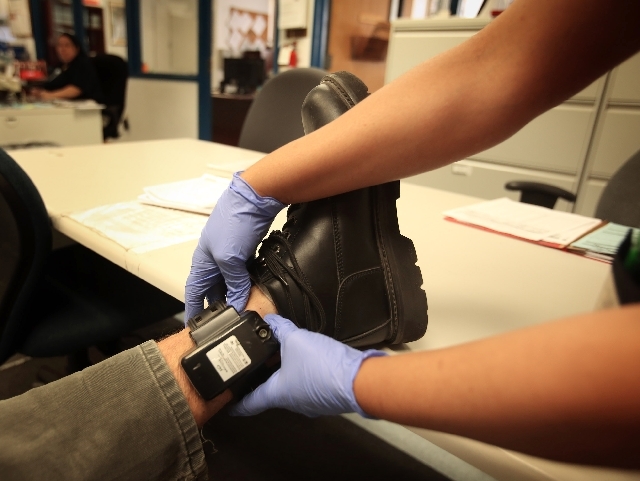Off house arrest, but in arrears
Inmates in the Metropolitan Police Department’s house arrest program aren’t confined within the walls of the Clark County Detention Center.
Instead, the nonviolent offenders live at home, with the freedom to work at their jobs.
Nearly 300 inmates are under house arrest. They wear discreet ankle bracelets that make it easier to monitor them, complete with a box-shaped GPS small enough to cover with jeans.
To participate in the program, they have to follow the rules and regularly check in with staff at the detention center. They also are required to pay the Police Department $10 a day, unless they qualify for a reduced rate.
But many of them end up not paying what they still owe under repayment agreements after leaving the program.
Furthermore, the program has a spotty record of pursuing delinquent fees, with hundreds of thousands of dollars in uncollected fees each year, an audit completed in January by the Clark County Audit Department found.
In a review of 10 years’ worth of accounting records, the audit found inmates no longer in the program still owed nearly $3.5 million, an average of $347,000 for each fiscal year.
Efforts to collect the money have been inconsistent. For example, the program sent collections letters to former inmates owing money between 2006 and 2009.
“However, this practice is not conducted on a formal routine and is not included in standard operating procedures,” the auditor wrote.
The program also isn’t sending 30-day, 60-day and 90-day invoices to those who fall behind in payments, the audit found. Just 24 percent of former house arrest inmates showed a balance of zero. Of the inmates still owing money when they left the program, less than half — 46 percent — made a payment after exiting the house arrest program.
The Police Department is planning for improvements following the audit, which Sheriff Doug Gillespie’s office requested. It is working with the county comptroller’s office on potential changes to its collections policies, said police Capt. Frank Reagan, based at the Staff Operations Bureau of the detention center.
In his written response to the auditor’s finding, Reagan agreed with the recommendations to improve invoicing. He also noted that in many cases, someone in the program can complete the house arrest and court-ordered requirements in a short time while having three years to pay the fees.
Once they’re off the program, they aren’t wearing the electronic bracelets, but still owe money.
“Sometimes it’s hard to track down some of the folks that still owe money for the house arrest program,” Reagan said in an interview.
Although fee recovery can be a challenge, the program helps the detention center keep its overall costs down.
“The purpose of house arrest is to make sure that those individuals that qualify have some normalcy,” Reagan said. “Some of these folks have families and they have responsibilities. They could be a single parent and they’re the sole providers.”
About 15 staff members oversee the 283 house arrest inmates in the program, completing tasks such as house visits, checking ankle bracelets and overseeing the electronic monitoring. The nonviolent offenses of inmates under house arrest vary and can include driving under the influence and petit larceny.
Program participants also face random house visits and drug tests.
But if those house arrest inmates were in jail, more staff would be necessary, Reagan said.
That level of an increase would require about 25 officers to supervise inmates, he said.
“It is still an astronomical savings because if we did not have a house arrest program, we would have 280 more inmates,” he said.
And the detention center is already full. It has 3,609 inmates in the main county facility, with 226 more inmates held in other jurisdictions.
The program works to arrange reduced payments for those who can’t afford to pay the $10-a-day fee, looking at their income, debts and reliance on state welfare programs. Nevada code doesn’t require that the inmates under house arrest have jobs. A reduced payment could be as low as $1 a day, taking into account the hardship a higher amount would pose.
Program participants cannot live on the streets — they need a residence with electricity to plug in the charger for the GPS device.
Those involved in violent offenses such as murder and rape aren’t eligible. Also, criminal history is considered.
“We want to make sure the public doesn’t have a perception we just put anybody and everybody on the program,” Reagan said. “That’s not the case.”
The 2012 case of champion boxer Floyd Mayweather Jr. illustrates the scrutiny applicants face. Mayweather filed a motion in June 2012 seeking house arrest shortly after starting a three-month sentence in the county jail on misdemeanor charges of domestic battery and harassment. At the time, the motion argued that the diet and lack of exercise in jail would lead to “irreversible damage” to the boxer’s physique.
A judge ruled against the boxer.
Mayweather got out of jail in two months with time removed for good behavior. And he returned to boxing.
Contact reporter Ben Botkin at
bbotkin@reviewjournal.com or 702-455-4519.


















